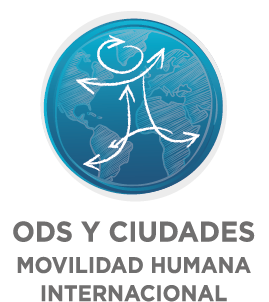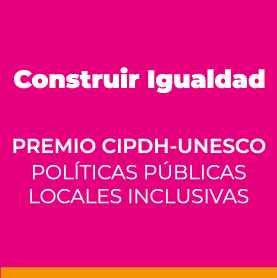
- Region
- Latin America and the Caribbean
- Range of Demographic Size
- 20,000 to 49,999 inhabitants (small)
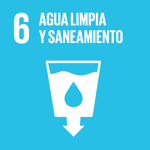
6.1 By 2030, achieve universal and equitable access to safe and affordable drinking water for all.
6.3 By 2030, improve water quality by reducing pollution, eliminating dumping and minimizing release of hazardous chemicals and materials, halving the proportion of untreated wastewater and substantially increasing recycling and safe reuse globally.
6.4 By 2030, substantially increase water-use efficiency across all sectors and ensure sustainable withdrawals and supply of freshwater to address water scarcity and substantially reduce the number of people suffering from water scarcity.
6.5 By 2030, implement integrated water resources management at all levels, including through transboundary cooperation as appropriate.
6.6 By 2020, protect and restore water-related ecosystems, including mountains, forests, wetlands, rivers, aquifers and lakes.
6.a By 2030, expand international cooperation and the support provided to developing countries for the creation of capacity in water- and sanitation-related activities and programmes, including water harvesting and storage, desalination, water efficiency of water resources, wastewater treatment, recycling and reuse technologies.
6.b Support and strengthen the participation of local communities in improving water and sanitation management.
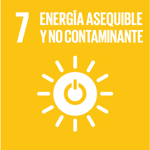
7.1 By 2030, ensure universal access to affordable, reliable and modern energy services.
7.2 By 2030, increase substantially the share of renewable energy in the global energy mix.
7.3 By 2030, double the global rate of improvement in energy efficiency.
7.a By 2030, enhance international cooperation to facilitate access to clean energy research and technologies, including renewable energy resources, energy efficiency and advanced and cleaner fossil-fuel technologies, and promote investment in energy infrastructure and clean energy technology.
7.b By 2030, expand infrastructure and upgrade technology for supplying modern and sustainable energy services for all in developing countries, in particular, the least developed countries, small island developing States, and land-locked developing countries, in accordance with their respective programmes of support.
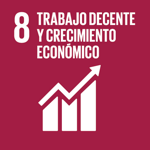
8.1 Sustain per capita economic growth in accordance with national circumstances and, in particular, at least 7 % gross domestic product growth per annum in the least developed countries.
8.2 Achieve higher levels of economic productivity through diversification, technological upgrading and innovation, including, among other things, through a focus on high-value added and labour-intensive sectors.
8.3 Promote development-oriented policies that support productive activities, decent job creation, entrepreneurship, creativity and innovation, and encourage the formalization and growth of micro-, small- and medium-sized enterprises, including through access to financial services.
8.4 Improve progressively, through 2030, global resource efficiency in consumption and production and endeavour to decouple economic growth from environmental degradation, in accordance with the 10-year framework of programmes on sustainable consumption and production, with developed countries taking the lead.
8.5 By 2030, achieve full and productive employment and decent work for all women and men, including for young people and persons with disabilities, and equal pay for work of equal value.
8.6 By 2020, substantially reduce the proportion of youth who are not employed and who do not attend studies or receive training.
8.7 Take immediate and effective measures to eradicate forced labour, end modern slavery and human trafficking and secure the prohibition and elimination of the worst forms of child labour, including recruitment and use of child soldiers, and by 2025 end child labour in all its forms.
8.8 Protect labour rights and promote safe and secure working environments for all workers, including migrant workers, in particular women migrants, and those in precarious employment.
8.9 By 2030, devise and implement policies to promote sustainable tourism that creates jobs and promotes local culture and products.
8.10 Strengthen the capacity of domestic financial institutions to encourage and expand access to banking, insurance and financial services for all.
8.a Increase Aid for Trade support for developing countries, in particular, least developed countries, including in through the Enhanced Integrated Framework for Trade-Related Technical Assistance to Least Developed Countries.
8.b By 2020, develop and operationalize a global strategy for the employment of youths and implement the Global Jobs Pact of the International Labour Organization.
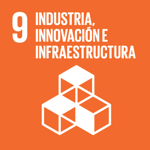
9.1 Develop quality, reliable, sustainable and resilient infrastructure, including regional and transborder infrastructure, to support economic development and human well-being, with a focus on affordable and equitable access for all.
9.2 Promote inclusive and sustainable industrialization and, by 2030, significantly raise the contribution of industry to the employment and gross domestic product, in line with national circumstances, and double that share in the least developed countries.
9.3 Increase the access of small-scale industrial and other enterprises, in particular in developing countries, to financial services, including affordable credit, and their integration into value chains and markets.
9.4 By 2030, upgrade infrastructure and retrofit industries to make them sustainable, with increased resource-use efficiency and greater adoption of clean and environmentally sound technologies and industrial processes, with all countries taking action in accordance with their respective capabilities.
9.5 Enhance scientific research, upgrade the technological capabilities of industrial sectors in all countries, in particular, the developing countries, including among other things, encouraging innovation and substantially increasing the number of research and development workers per 1 million people, as well as increasing the spending in and public and private research and development for 2013.
9.a Facilitate sustainable and resilient infrastructure development in developing countries through enhanced financial, technological and technical support to African countries, least developed countries, landlocked developing countries and small island developing States.
9.b Support domestic technology development, research and innovation in developing countries, including by ensuring a conducive policy environment for, inter alia, industrial diversification and value addition to commodities.
9.c Significantly increase access to information and communications technology and strive to provide universal and affordable access to the Internet in least developed countries by 2020.
C - Ageing, social protection and socioeconomic challenges
G - Territorial inequality, spatial mobility and vulnerability
J- Frameworks for startup of future regional agenda on population and development
International Convention on the Protection of the Rights of All Migrant Workers and Members of their Families (CRMW).
International Covenant on Civil and Political Rights (ICCPR).
International Covenant on Economic, Social and Cultural Rights (ICESCR).
UN Guiding Principles on Business and Human Rights.
Additional Protocol to the American Convention on Human Rights in economic, social and cultural rights (San Salvador Protocol).
Summary
Implementation Date:
Start: 01 / 2 / 2001
End: End: Currently in force
Seminars/events
Social/citizen participation
Institutional strengthening
Systems of production, survey, systematization and monitoring of information (data)
Advice
Foreign credit
Subnational goverment
(Español) https://santahelena.atende.net/cidadao/pagina/coleta-e-reciclagem
(Español) https://redeglobo.globo.com/rpc/plug/noticia/santa-helena-conheca-a-terra-das-aguas-com-o-plug.ghtml
(Español) https://www.jornalavozdoparana.com.br/post/736/santa-helena-investe-na-melhoria-da-qualidade-de-vida-dos-agricultores-
(Español) https://santahelena.portaldacidade.com/noticias/cidade/com-51-de-aumento-santa-helena-e-o-5o-municipio-do-parana-em-producao-agricola-0845
(Español) https://www.jornalavozdoparana.com.br/post/58574/santa-helena-e-destaque-em-producao-agricola
(Español) https://santahelena.portaldacidade.com/noticias/cidade/sta-helena-e-a-primeira-no-ranking-estadual-em-reflorestamento-da-mata-atlantica-3230
(Español) https://www.ibge.gov.br/cidades-e-estados/pr/santa-helena.html
(Español) http://habitat.aq.upm.es/dubai/04/bp1881.html#sigla-PRODEM
(Español) https://ruraltechsantahelena.com.br/todas-as-noticias/
(Español) https://www.agricultura.pr.gov.br/vbp
- Email: gabinete@santahelena.pr.gov.br
- Web: https://santahelena.atende.net/cidadao
- Telephone: (Español) (45) 3268-8200
Instrumentos

6.1 By 2030, achieve universal and equitable access to safe and affordable drinking water for all.
6.3 By 2030, improve water quality by reducing pollution, eliminating dumping and minimizing release of hazardous chemicals and materials, halving the proportion of untreated wastewater and substantially increasing recycling and safe reuse globally.
6.4 By 2030, substantially increase water-use efficiency across all sectors and ensure sustainable withdrawals and supply of freshwater to address water scarcity and substantially reduce the number of people suffering from water scarcity.
6.5 By 2030, implement integrated water resources management at all levels, including through transboundary cooperation as appropriate.
6.6 By 2020, protect and restore water-related ecosystems, including mountains, forests, wetlands, rivers, aquifers and lakes.
6.a By 2030, expand international cooperation and the support provided to developing countries for the creation of capacity in water- and sanitation-related activities and programmes, including water harvesting and storage, desalination, water efficiency of water resources, wastewater treatment, recycling and reuse technologies.
6.b Support and strengthen the participation of local communities in improving water and sanitation management.

7.1 By 2030, ensure universal access to affordable, reliable and modern energy services.
7.2 By 2030, increase substantially the share of renewable energy in the global energy mix.
7.3 By 2030, double the global rate of improvement in energy efficiency.
7.a By 2030, enhance international cooperation to facilitate access to clean energy research and technologies, including renewable energy resources, energy efficiency and advanced and cleaner fossil-fuel technologies, and promote investment in energy infrastructure and clean energy technology.
7.b By 2030, expand infrastructure and upgrade technology for supplying modern and sustainable energy services for all in developing countries, in particular, the least developed countries, small island developing States, and land-locked developing countries, in accordance with their respective programmes of support.

8.1 Sustain per capita economic growth in accordance with national circumstances and, in particular, at least 7 % gross domestic product growth per annum in the least developed countries.
8.2 Achieve higher levels of economic productivity through diversification, technological upgrading and innovation, including, among other things, through a focus on high-value added and labour-intensive sectors.
8.3 Promote development-oriented policies that support productive activities, decent job creation, entrepreneurship, creativity and innovation, and encourage the formalization and growth of micro-, small- and medium-sized enterprises, including through access to financial services.
8.4 Improve progressively, through 2030, global resource efficiency in consumption and production and endeavour to decouple economic growth from environmental degradation, in accordance with the 10-year framework of programmes on sustainable consumption and production, with developed countries taking the lead.
8.5 By 2030, achieve full and productive employment and decent work for all women and men, including for young people and persons with disabilities, and equal pay for work of equal value.
8.6 By 2020, substantially reduce the proportion of youth who are not employed and who do not attend studies or receive training.
8.7 Take immediate and effective measures to eradicate forced labour, end modern slavery and human trafficking and secure the prohibition and elimination of the worst forms of child labour, including recruitment and use of child soldiers, and by 2025 end child labour in all its forms.
8.8 Protect labour rights and promote safe and secure working environments for all workers, including migrant workers, in particular women migrants, and those in precarious employment.
8.9 By 2030, devise and implement policies to promote sustainable tourism that creates jobs and promotes local culture and products.
8.10 Strengthen the capacity of domestic financial institutions to encourage and expand access to banking, insurance and financial services for all.
8.a Increase Aid for Trade support for developing countries, in particular, least developed countries, including in through the Enhanced Integrated Framework for Trade-Related Technical Assistance to Least Developed Countries.
8.b By 2020, develop and operationalize a global strategy for the employment of youths and implement the Global Jobs Pact of the International Labour Organization.

9.1 Develop quality, reliable, sustainable and resilient infrastructure, including regional and transborder infrastructure, to support economic development and human well-being, with a focus on affordable and equitable access for all.
9.2 Promote inclusive and sustainable industrialization and, by 2030, significantly raise the contribution of industry to the employment and gross domestic product, in line with national circumstances, and double that share in the least developed countries.
9.3 Increase the access of small-scale industrial and other enterprises, in particular in developing countries, to financial services, including affordable credit, and their integration into value chains and markets.
9.4 By 2030, upgrade infrastructure and retrofit industries to make them sustainable, with increased resource-use efficiency and greater adoption of clean and environmentally sound technologies and industrial processes, with all countries taking action in accordance with their respective capabilities.
9.5 Enhance scientific research, upgrade the technological capabilities of industrial sectors in all countries, in particular, the developing countries, including among other things, encouraging innovation and substantially increasing the number of research and development workers per 1 million people, as well as increasing the spending in and public and private research and development for 2013.
9.a Facilitate sustainable and resilient infrastructure development in developing countries through enhanced financial, technological and technical support to African countries, least developed countries, landlocked developing countries and small island developing States.
9.b Support domestic technology development, research and innovation in developing countries, including by ensuring a conducive policy environment for, inter alia, industrial diversification and value addition to commodities.
9.c Significantly increase access to information and communications technology and strive to provide universal and affordable access to the Internet in least developed countries by 2020.
C - Ageing, social protection and socioeconomic challenges
G - Territorial inequality, spatial mobility and vulnerability
J- Frameworks for startup of future regional agenda on population and development
International Convention on the Protection of the Rights of All Migrant Workers and Members of their Families (CRMW).
International Covenant on Civil and Political Rights (ICCPR).
International Covenant on Economic, Social and Cultural Rights (ICESCR).
UN Guiding Principles on Business and Human Rights.
Additional Protocol to the American Convention on Human Rights in economic, social and cultural rights (San Salvador Protocol).
Location
- Region
- Latin America and the Caribbean
- Range of Demographic Size
- 20,000 to 49,999 inhabitants (small)
Contact details
- Email: gabinete@santahelena.pr.gov.br
- Web: https://santahelena.atende.net/cidadao
- Telephone: (Español) (45) 3268-8200
- Social network:


